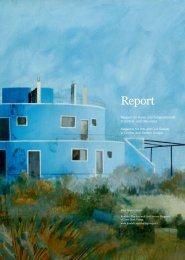Report_Issue 1/2009 - Jubiläum/ 20 Jahre Mauerfall
Report_Issue 1/2009 - Jubiläum/ 20 Jahre Mauerfall
Report_Issue 1/2009 - Jubiläum/ 20 Jahre Mauerfall
Erfolgreiche ePaper selbst erstellen
Machen Sie aus Ihren PDF Publikationen ein blätterbares Flipbook mit unserer einzigartigen Google optimierten e-Paper Software.
“Eating is something political”<br />
Antje Mayer: That looks marvellous. You are<br />
making me a Šopska salad. When I make it at<br />
home why does it never taste as good as it does<br />
in the Balkans?<br />
Barbara Maier: you have to chop the ingredients<br />
– cucumbers and tomatoes – as finely as<br />
possible. And also: in restaurants in the Balkans<br />
it is always freshly made. It doesn’t swim<br />
for hours in the kitchen in a salad sauce until it<br />
becomes completely soggy. I think that is the<br />
secret. Oh, and don’t use vinegar. Everybody<br />
can add some vinegar at the table if they want<br />
to. The feta cheese must be grated over it freshly<br />
at the table – generously. In my opinion you<br />
can safely leave out onions.<br />
Lojze Wieser: For me the pieces could be a little<br />
larger and I think onion rings belong in the<br />
salad. We differ in this respect. I always thought<br />
that Šopska salad, which is like a Greek salad,<br />
is a typical Yugoslav dish. Therefore I was all<br />
the more surprised when I learned that the<br />
name comes from a sheep rearing people, the<br />
Schopen, who lived in the area around Sofia in<br />
Bulgaria. The shepherds had plenty of cheese<br />
and vegetables and could live from these<br />
foods over the summer. In Živko Skračić’ book<br />
“Artischockenherz und Mandelkern” (Artichoke<br />
Hearts and Almond Kernels) I read that<br />
there were similar simple “survival dishes” in<br />
Dalmatia also. There the farmers ate only a<br />
handful of almonds every day and washed them<br />
down with wine. Incidentally, Çopan in Turkish<br />
means shepherd, and there the same kind<br />
of salad is known as “Çopan salad", shepherds’<br />
salad.<br />
I also know this salad from Ukraine where people<br />
eat it with a lot of dill and parsley. They use<br />
almost as many finely chopped herbs as they do<br />
of the other ingredients, which makes the salad<br />
taste very fresh and means that it is full of vitamins.<br />
B. M.: That sounds very interesting. You live<br />
and learn. Let's try that out straight away.<br />
(Goes into the garden and comes back with a<br />
bunch of herbs.)<br />
Last year you undertook a 17-day-long culinary<br />
research tour in the Balkans. What did you<br />
bring back with you in terms of new tastes?<br />
B. M.: We drove over 5000 kilometres with our<br />
Barbara Maier, cultural and scientific mediator, and publisher and author Lojze Wieser undertook a culinary voyage of<br />
discovery in the Balkans. The pair invited Antje Mayer to a meal in their house in Klagenfurt where they served Šopskasalad,<br />
goulash and cooled Rakia, told about dishes they had tasted and philosophised about the social implications<br />
of eating, drinking and preparing meals.<br />
— Antje Mayer talks to Barbara Maier and Lojze Wieser —<br />
ancient Škoda Octavia, travelled through nine<br />
countries and made 45 interviews, visited 38<br />
restaurants and tasted over one hundred dishes.<br />
I felt wonderful, didn’t put on an ounce and<br />
never had a problem with my digestion.<br />
What did you enjoy best?<br />
B. M.: I was impressed by the variety of the<br />
new kinds of tastes. The overall impression I<br />
had was a very sensual one. In restaurants in<br />
the Balkans cooking is not hidden behind milk<br />
glass screens but is part of the entire enjoyment<br />
of eating and drinking. In places Meals<br />
are still cooked on an open fire and as a starter<br />
the guest “eats” with his nose and naturally also<br />
with his ears.<br />
Through communism, but due also to strict<br />
EU norms and the trend towards globalisation<br />
many culinary traditions in the central and<br />
southeast European countries have been lost.<br />
Is a new generation rediscovering the “memory<br />
of the palate"?<br />
L. W.: In Slovenia the classic cookery book<br />
“Slovenska kuharica”, which contains 900 recipes,<br />
has been republished 28 times. The first<br />
edition of this work appeared in 1868. Recipes<br />
are living things that experience changes over<br />
the decades. What are known as the fast- or<br />
Lenten meals are not found in the later editions<br />
because during the socialist era the religious<br />
concept of fasting could not be mentioned.<br />
Since the fall of communism these dishes have<br />
been included again, by the way.<br />
But let's not try to disguise the facts. A great<br />
deal of knowledge about the nature, the method<br />
of preparation and not least of all the medicinal<br />
healing properties of foodstuffs has been irretrievably<br />
lost in the East – and indeed in the<br />
West. People today no longer know how to use<br />
foodstuffs.<br />
We use food wastefully nowadays. In a text she<br />
wrote for “<strong>Report</strong>” the young Ukrainian writer<br />
Marjana Gaponenko expressed her amazement<br />
that we separate our rubbish in the West.<br />
In Ukraine this isn't necessary as there is hardly<br />
anything to separate there, everything is used up.<br />
B. M.: Take a chicken for example. You can use<br />
every part of it from the stomach to the comb<br />
and you don’t have to throw anything away. I<br />
think that you still experience this respect for<br />
the foods we eat in the Balkans more often, because<br />
the natural cycle of things has not been<br />
interrupted.<br />
L. W.: I enjoy offal for example and also like<br />
to cook it. When my wife invites her friends I<br />
cook tripe soup for them. This is a question of<br />
trust. Offal in general is cheap and – contrary<br />
to its reputation – good for your health. Venison<br />
liver, for example, helps against arthritis<br />
but you generally can't buy it in a shop as the<br />
hunters keep this specialty for themselves. For<br />
hygiene reasons a lot of abattoirs do not deliver<br />
offal any more; for example it costs too much<br />
to properly wash intestines. The “disgusting”<br />
remnants are, at best, made into cat and dog<br />
food or simply disposed of.<br />
Are the many cookery programmes now found<br />
on television in the Balkans, just like here, not<br />
bringing about a revival of interest?<br />
L. W.: Many people, above all the younger ones,<br />
can no longer cook and these lifestyle programmes<br />
in television don’t alter anything in<br />
that respect.<br />
It makes them increasingly dependent on a<br />
global food industry that offers ready-made<br />
products and that caters for as general a taste<br />
as possible. The sensitivity towards different<br />
combinations of tastes is lost and with it the respect<br />
for the production of foodstuffs. This also<br />
results in the spread of poverty, as people can<br />
no longer cook for themselves.<br />
With regard to poverty: in your book “Kochen<br />
unter anderen Sternen” you tell about the beggar<br />
Ina, known throughout the village, who<br />
during your childhood came to visit your family<br />
at regular intervals …<br />
L. W.: When Ina came my mother did not serve<br />
margarine but butter. Ina was given real coffee<br />
which was very valuable and my father put a<br />
frakali, a little glass, of the best schnapps on the<br />
table. Probably a relic from the Middle Ages, a<br />
memento mori: the more you give the greater<br />
your reward in heaven after you die. Hospitality<br />
was an important cultural value – as it is in<br />
the Balkans today – that preserved a social balance.<br />
Eating and drinking connects people!<br />
L. W.: Like literature cooking is one of the cornerstones<br />
of a culture. Like language, food is<br />
“prepared” with the tongue, is the expression<br />
of an identity, brings people together, has an<br />
importance in terms of social hygiene. I would<br />
even go so far as to assert that eating is something<br />
political.<br />
Barbara Maier, cultural and scientific mediator, was<br />
born in 1961 and studied German language and literature<br />
and the history of art. She is head of the department<br />
of knowledge transfer at the Alpen-Adria University<br />
in Klagenfurt.<br />
Lojze Wieser was born in 1954 and has published<br />
books since 1979. From 1981 to 1986 he headed<br />
Drava Verlag and since 1987 has been the owner of the<br />
Wieser Verlag. He was awarded the First Austrian State<br />
Prize for publishing.<br />
Booktips<br />
Lojze Wieser: “Kochen unter anderen Sternen. Geschichten<br />
von entlegenen Speisen”, Czernin Verlag, Vienna,<br />
<strong>20</strong>07<br />
Hans Gerold Kugler, Barbara Maier: “Santoninos Kost",<br />
Wieser Verlag, Klagenfurt/Celovec <strong>20</strong>01; published in<br />
German, Slovene and Italian<br />
“Geschmacksverwandschaften. Eine kleine europäische<br />
Speisefibel mit Geschichten und Rezepten”, collected<br />
by Lojze Wieser, Christoph Wagner and Barbara Maier,<br />
Wieser Verlag, Klagenfurt/Celovec <strong>20</strong>08<br />
Norbert Schreiber, Lojze Wieser, “Wie schmeckt<br />
Europa?”, Wieser Verlag, Klagenfurt/Celovec <strong><strong>20</strong>09</strong><br />
www.czernin-verlag.at<br />
www.wieser-verlag.com<br />
Published in “<strong>Report</strong>” in July <strong>20</strong>08 (online)<br />
79




